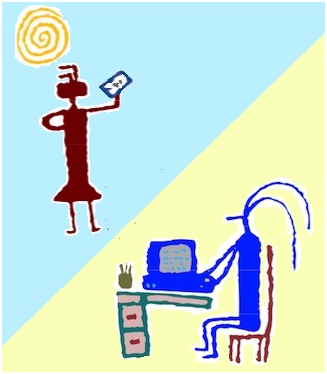
Happy New Year!
When I directed the Virtual Volunteering Project back in the 1990s and did workshops introducing virtual volunteering to a room full of representatives from nonprofits and government agencies, an early question I got was, “Who owns what an online volunteer creates as a part of their service?” So I asked the various experts in traditional volunteer management for the answer – and they didn’t know! That question had never come up for them. It took cornering a panel of lawyers at a conference (they were presenting on liability and volunteers) to get the answer: volunteers own what they create.
Two more recent articles confirm this:
In this article from INFORMATION OUTLOOK V16 N04 JULY/AUGUST 2012, Volunteers are Copyright Owners, Too!, author and copyright lawyer Lesley Ellen Harris notes, “Whether it be an article, image, video, business plan, table based on research, or other type of content, it is possible that the material being created by your volunteers is automatically protected by copyright (yes, even without registering the material or using a copyright symbol).” The article strongly recommends entering into a copyright agreement with volunteers to help prevent problems, such as a volunteer quitting and demanding that you stop using their work.
This February 2019 article from copyrightlaws.com, Who Owns Copyright in Works By Volunteers, affirms the previous recommendation: “You may want to consider developing an agreement with your volunteers that transfers to your organization the copyright in any works they create for you. Such an agreement ensures your organization can use their work as needed. It can also address the liability of volunteers using third-party works without obtaining permission.” It’s something companies frequently include in a contract that an employee or contractor/consultant signs, but that they often forget to have volunteers sign.

As noted in The Last Virtual Volunteering Guidebook, developing written agreements to be signed by both online volunteers and their host organization (page 66) can prevent problems down the road, not only regarding ownership and use of what an online volunteer create, including web sites and code, but also regarding confidentiality and privacy in using of the volunteer’s information, including images of them, regarding confidentiality regarding the organization and the information the volunteer has access to, particularly client information, regarding how the online volunteer should represent his or her association with the program online (in emails, on social media, on LinkedIn, etc.), and liability regarding malware.
That said, I regularly look for controversies regarding volunteers and the materials they create for programs they support, particularly regarding copyright, and haven’t found anything. But just because there hasn’t been a newspaper article, newsletter article or blog about it doesn’t mean it hasn’t happened.
And note: I’m not a lawyer. Don’t use this blog as your ultimate, last guidance. If volunteers are creating things for you, or engaging in activities that result in a product or program you use (photos, a strategy, a database, etc.), talk to a lawyer about legal agreements you may want to have volunteers sign regarding use and ownership of what they create for your program.
Also see legal issues and virtual volunteering.

If you have benefited from this blog or other parts of my web site or my YouTube videos and would like to support the time that went into researching information, developing material, preparing articles, updating pages, etc. (I receive no funding for this work), here is how you can help.
